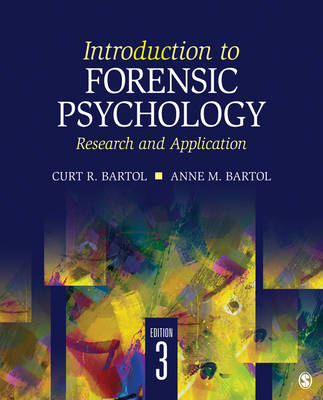
Introduction to Forensic Psychology
SAGE Publications Inc (Verlag)
978-1-4129-9175-9 (ISBN)
- Titel erscheint in neuer Auflage
- Artikel merken
This book is a broad introduction to the field of forensic psychology. While students most often associate forensic psychology with criminal profiling, crime-scene investigations, and serial murder, this text covers the many other areas where psychology has played a significant role in providing research knowledge to the civil and criminal justice systems.
The book is a readable summary of contemporary research and practice across a broad spectrum of topics. Practical applications are discussed where pertinent, and case law discussions are found throughout the text.
This book is designed for undergraduate and graduate students studying forensic psychology in psychology, criminal justice, and criminology courses. This book will also be of interest to mental health professionals and anyone looking for a basic overview of the field.
New to the Third Edition:
- more real-life cases, new guest essays, and 2-3 new photos per chapter involve students in the ′human side′ of forensic psychology
- new information on timely topics - such as relationships between mental disorders and crime and violence, sexual deviance, death penalty mitigation, restorative justice initiatives, arson and typologies of juvenille offenders, sexual harassment, and criminal sentencing
- new focus boxes cover drug courts, doctoral programs in forensic psychology, the ′choking game′, the Innocence Project, bias crime, and many others
- a greater emphasis on clinical psychology throughout
- thoroughly revised coverage of police psychology
- substantially re-organized material on profiling
- revised and expanded lecturer resources and student study site
Key Features of the Third Edition:
- broad coverage makes the text ideal for undergraduate and postgraduate students of both criminology and psychology
- exposes readers to the many careers related to forensic psychology
- concentrates on the application side of the field, focusing on research-based forensic practice to emphasize the use of psychological knowledge, concepts, and principles
- emphasises the multicultural perspective that is an integral part of the day-to-day work of all practicing and research psychologists
- in-text learning aids include chapter-opening learning objectives, chapter-ending review questions, chapter summaries, and a glossary of key terms.
Curt R. Bartol was a college professor for more than 30 years, teaching a wide variety of both undergraduate and graduate courses, including Biopsychology, Criminal Behavior, Juvenile Delinquency, Introduction to Forensic Psychology, Social Psychology, Profiling, and Psychology and Law. He earned his PhD in personality/social psychology from Northern Illinois University in 1972. He studied political science and law at the University of Wisconsin-Madison under a fellowship from the National Institute for the Humanities (NIH). He was instrumental in creating and launching Castleton State College’s graduate program in forensic psychology and served as its director for 6 years. As a licensed clinical psychologist, he has been a consulting police psychologist to local, municipal, state, and federal law enforcement agencies for over 30 years. In addition to Introduction to Forensic Psychology, he has coauthored Criminal Behavior: A Psychosocial Approach (now in its 11th ed.), Juvenile Delinquency and Antisocial Behavior: A Developmental Perspective (3rd ed.), Criminal and Behavioral Profiling, and Psychology and Law: Theory, Research, and Application (3rd ed.). He served as editor of SAGE’s Criminal Justice and Behavior: An International Journal, for 17 years. He also co-edited Current Perspectives in Forensic Psychology and Criminal Behavior (3rd ed.). Anne M. Bartol earned an MA and a PhD in criminal justice from State University of New York at Albany. She also holds an MA in journalism from the University of Wisconsin–Madison. She taught criminal justice, sociology, and journalism courses over a 20-year college teaching career and has worked as a journalist and a social worker in child and adolescent protective services. In addition to Introduction to Forensic Psychology, she has coauthored Juvenile Delinquency: A Systems Approach; Delinquency and Justice: A Psychosocial Approach; Psychology and Law: Theory, Research, and Application; Criminal Behavior; and Criminal and Behavioral Profiling. She co-edited Current Perspectives, has served as book review editor and managing editor of Criminal Justice and Behavior and has published articles on women and criminal justice, rural courts, and the history of forensic psychology.
PART I. Introduction
1. Forensic Psychology: Introduction and Overview
PART II. Police and Investigative Psychology
2. Police Psychology
3. Investigative Psychology
PART III. Legal Psychology
4. Consulting and Testifying
5. Consulting with Criminal Courts
6. Consulting with Juvenile and Civil Courts
PART IV. Criminal Psychology
7. The Development of Delinquent and Criminal Behavior
8. Psychology of Violence and Intimidation
9. Psychology of Sexual Assault
PART V. Victimology and Victim Services
10. Forensic Psychology and the Victims of Crime and Other Wrongs
11. Family Violence, Abuse and Victimization
PART VI. Correctional Psychology
12. Correctional Psychology in Adult Settings
13. Juvenile Corrections
| Erscheint lt. Verlag | 4.5.2011 |
|---|---|
| Verlagsort | Thousand Oaks |
| Sprache | englisch |
| Maße | 187 x 231 mm |
| Gewicht | 910 g |
| Themenwelt | Geisteswissenschaften ► Psychologie |
| Studium ► 2. Studienabschnitt (Klinik) ► Rechtsmedizin | |
| Recht / Steuern ► Strafrecht ► Kriminologie | |
| ISBN-10 | 1-4129-9175-7 / 1412991757 |
| ISBN-13 | 978-1-4129-9175-9 / 9781412991759 |
| Zustand | Neuware |
| Haben Sie eine Frage zum Produkt? |
aus dem Bereich



